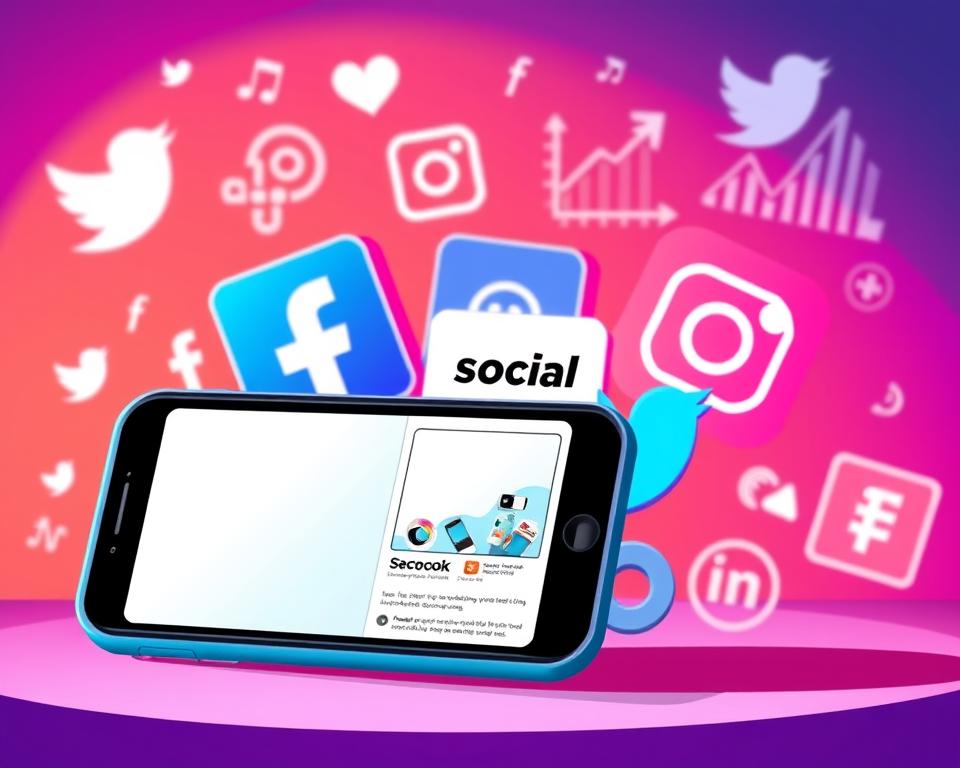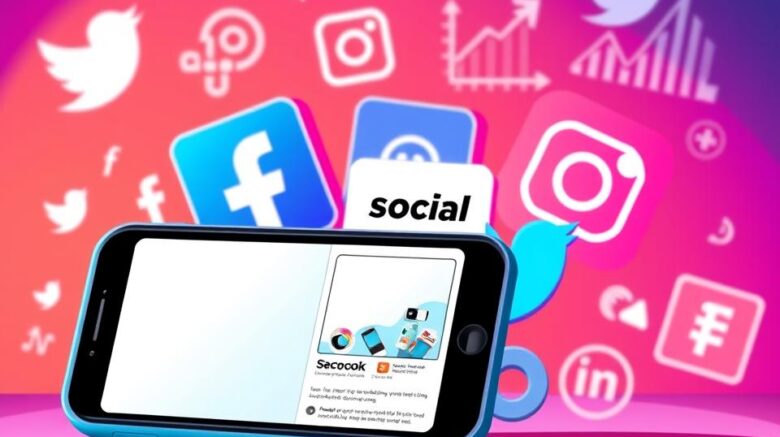1on1 Marketing: Unlock Personalized Customer Engagement.
Have you ever wondered why certain brands resonate with their audience while others fall flat? The answer is 1on1 Marketing, a revolutionary approach that converts generic marketing into personalized experiences. By dialing into personal preferences, it forges a bond that mass marketing simply can’t replicate. This approach shifts the focus from mass marketing to tailored strategies that speak directly to each customer’s heart.
By adopting 1on1 Marketing, businesses can build more meaningful connections. They design strategies that genuinely strike a chord with their audience. Here, we explore the essence of 1on1 Marketing and how it allows brands to engage with customers individually, 1on1.
The Evolution of Marketing Strategies
Over time, the marketing landscape has experienced a dramatic shift. Initially, marketers used one-size-fits-all strategies, relying on broad messaging for average consumer behavior. Now, the expectation is for engagement through tailored conversations. This transition highlights the necessity to see customers as individuals rather than as a homogeneous mass.
With marketing’s evolution, it’s clear that generic tactics no longer cut it. Modern strategies aim to create meaningful interactions, building relationships instead of just pushing products. Marketers now use data insights to inform their approach, moving towards personalized tactics that meet unique customer needs.
This evolution not only deepens customer connections but also boosts brand loyalty and retention. In today’s crowded market, brands offering personalized journeys shine. They create spaces for dialogue and engagement, ensuring customers feel valued.

| Strategy Type | Characteristics | Example |
|---|---|---|
| One-Size-Fits-All | Broad messaging, general appeal | Generic ad campaigns |
| Tailored Tactics | Individual focus, fine-tuned reach | Segmented email flows |
Personalization’s Role in B2B
The B2B marketing landscape is rapidly changing, making personalization essential. Professionals aim to improve conversions via personalized 1on1 strategies. Research indicates that many view this as critical for retention. In a rapid-fire environment, engaging audiences effectively is vital.
Customization addresses the hurdle of capturing attention. It makes sure messaging aligns with each individual’s tastes. This focus on individual experiences helps brands stand out in crowded markets.
The rise in customer touchpoints has heightened the need for personalized engagement. Brands that adopt personalized strategies meet customer needs and build lasting connections. This approach can give a significant edge in the competitive market today.
What Is 1on1 Marketing?
One-to-one Marketing focuses on customizing experiences for each customer. It leverages data insights to design bespoke engagement tactics. By concentrating on individual experiences, it fosters robust customer bonds.
For example, a coffee shop where the barista remembers a customer’s favorite order illustrates one-to-one marketing. This simple gesture demonstrates how attending to preferences drives satisfaction. It turns a simple transaction into a memorable experience, building loyalty.
Implementing one-to-one Marketing requires a deep dive into customer data. They analyze behaviors and preferences to customize messaging. This ensures their marketing efforts connect with individual tastes, leading to stronger customer connections and higher satisfaction.
As companies pursue personalized engagement, they recognize that customization is key lasting success. Those who excel in creating individualized experiences gain significant benefits from their efforts.
Why Personalized Engagement Pays Off
Personalized customer engagement brings numerous benefits to modern brands. It significantly boosts customer satisfaction by providing tailored experiences that meet individual preferences and needs. Studies show that 80% of consumers prefer to buy from brands that offer personalized interactions. This highlights the significant impact of customized marketing.
Loyalty programs that incorporate personalization tend to retain customers better. By targeting distinct pain points and tastes, companies foster a sense of being valued. This link encourages repeat business, increasing profits.
Tailored marketing results in better conversion rates. Custom suggestions and targeted messaging guide customers from consideration to purchase. Highlighting the benefits of personalized marketing enhances brand perception and positions businesses for success in a competitive market.
| Benefit | Description | Impact |
|---|---|---|
| Customer Satisfaction | Personalized experiences improve overall customer happiness. | Increased chances of repeat purchases. |
| Loyalty Programs | Custom offers boost customer engagement. | Stronger retention and brand loyalty. |
| Sales Upsurge | Targeted content drives customer actions effectively. | Boost in sales and revenue. |
Hurdles to Personalized Marketing
Implementing tailored marketing presents several challenges. Collecting quality data is a primary obstacle. Robust data is essential for effective segmentation. Without this, campaigns miss the mark, squandering opportunities and resources.
Brands targeting specific audiences must navigate the fine line between personalized and generic communication. Big enterprises struggle to keep a personal touch amid heavy automation. This risks eroding the personal connection customers value. – Marketing 1on11 on 1
Smaller businesses also have their own set of challenges. They often struggle to define their messaging, hindering their ability to leverage personalized marketing’s benefits. Recognizing these challenges is essential for marketers aiming to improve their strategies and engage customers more effectively.
Technologies Driving 1on1 Marketing
Groundbreaking technologies in marketing are reshaping the realm of personalized customer engagement. CRM systems are pivotal for managing customer data. They organize data, essential for crafting bespoke experiences. A robust CRM system allows companies to grasp customer preferences and behaviors more deeply.
AI in marketing improves personalization by enabling more accurate targeting and automating tasks. ML algorithms process large datasets to reveal trends and behaviors. This enables strategy refinement. Such automation cuts down on manual work and boosts the effectiveness of marketing campaigns.
Studies reveal that 72% of marketers focus on CRM systems for personalization. Marketing automation tools are used by 55% to streamline campaigns. These technologies empower businesses to offer customized experiences on a large scale. They ensure campaigns connect with individuals rather than broad audiences.
The integration of these technologies in marketing fosters a more dynamic approach to customer engagement. The rapidly changing landscape prompts marketers to embrace advanced tools. These tools not only improve efficiency but also strengthen connections with their audiences.
Personalization Best Practices
Effective personalized marketing hinges on key best practices. They guarantee resonance and improved engagement. The core elements include:
- Segmenting Your Audience is essential for targeting specific groups based on common traits. It enables precision messaging, driving engagement rates.
- Using refined communication improves the customer experience. Consistent, relevant communication across channels builds trust and encourages continued interaction.
- Adopting testing strategies, like A/B testing, is critical. It helps pinpoint the most impactful marketing approaches by comparing different messages and metrics.
Leveraging customer data is crucial to grasp behaviors and preferences. Marketers should regularly analyze this data to refine their strategies. By adhering to these best practices, brands can craft a personalized approach that resonates with their target audience.
Creative Ways to Personalize
Creative marketing strategies are key to improving personalized experiences at every customer touchpoint. Brands now use personalized emails that match individual tastes, making messages more impactful. Analyzing purchase history allows spot-on product suggestions, driving sales.
Creating videos for specific audience segments is another smart move. It grabs attention and builds a strong emotional bond between the brand and its audience. Adaptive loyalty programs that align with behaviors reward meaningful interactions, enriching the journey.
| Creative Tactic | Description | Benefit |
|---|---|---|
| Tailored Emails | Emails crafted to individual preferences and behaviors. | Boosts engagement and conversion rates. |
| Suggested Products | Suggestions based on previous purchases and browsing history. | Enhances sales and customer satisfaction. |
| Tailored Videos | Video content customized for specific segments. | Deepens brand connection and engagement. |
| Loyalty Programs | Rewards systems that adapt to individual behaviors. | Increases loyalty and repeat business. |
Companies benefit by weaving customized offers into social media, email, and app alerts. Every touchpoint is an opportunity to showcase commitment to personalized engagement. It crafts memorable experiences, making brands stand out in a crowded landscape.
Future Trends in 1on1 Marketing
One-to-one Marketing is evolving fast, propelled by cutting-edge trends. Marketers will use AI to create personalized campaigns that meet individual needs. It enhances campaign outcomes and strengthens connections by delivering timely, relevant content.
Another key trend is the importance of omnichannel experiences. Consumers demand seamless transitions across social, email, and other channels. Brands must ensure consistent messaging to meet these expectations. Knowing interaction points helps craft a cohesive journey, enhancing loyalty.
Adapting to these shifts, ethical data practices will become essential for maintaining trust with consumers. Amid rising privacy concerns, transparency and responsibility in data handling are non-negotiable. Prioritizing ethical practices meets regulations and cultivates trust, paving the way for loyal relationships in one-to-one Marketing’s future.
